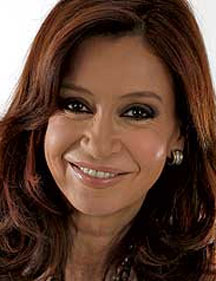BUENOS AIRES, (Reuters) – Argentina’s fiery centre-leftist president, Cristina Fernandez, swept to a landslide re-election victory yesterday, crowning a comeback that seemed unthinkable for much of her turbulent first term.

An exit poll showed Fernandez winning with 55 percent of the vote, about 40 percentage points ahead of her nearest rival, Socialist Hermes Binner.
No Argentine leader has won such a big share of the vote since Gen. Juan Domingo Peron was elected with 62 percent in 1973, and Fernandez’s supporters celebrated in downtown Buenos Aires, waving blue-and-white flags and chanting.
If confirmed by official results, the scale of Fernandez’s victory would give her a strong mandate to deepen the unconventional and interventionist economic policies that play well with many voters but irritate investors and farmers.
It marks a dramatic change of fortunes for a leader who some critics once said might have to leave power early as angry protests by farmers and middle-class voters battered her approval ratings soon after she took office.
When her husband and predecessor as president, Nestor Kirchner, died a year ago, many thought it spelled the end of the couple’s idiosyncratic blend of state intervention, nationalist rhetoric and the championing of human rights.
Instead, it prompted a wave of nostalgia for the best years of Kirchner’s 2003-2007 presidency and sympathy for a woman who suddenly seemed more likable.
A skilled orator fond of glamorous clothes and make-up, Fernandez still wears black as she mourns her husband and closest advisor. His image featured heavily in her campaign.
A splintered opposition and brisk economic growth helped Fernandez turn the sympathy vote into solid support.
Despite double-digit inflation and other signs of strain as global conditions worsen, Argentina’s economy is growing at about 8 percent a year and has regained some of its glory as the “breadbasket of the world” as grains shipments rise. Unemployment is at a 20-year low.
Voters with memories of the hyperinflation of the late 1980s and a severe economic crisis 10 years ago have good reason to think things could be worse than they are today.
“Crises come and go here and instability’s exhausting because you make plans and they keep going to waste,” said Marta Rey, 50, a teacher who voted for Fernandez’s Peronist party for the first time on Sunday. “It gives me a certain security for my son and for the future.”
Fernandez’s supporters highlight progress on expanding pensions coverage, child welfare benefits and the construction of schools and homes.
HEAVY-HANDED
The scale of Fernandez’s victory belies fierce opposition to her combative, heavy-handed style — typical of the Peronist party that has dominated Argentine politics for decades.
“It’s a complete mess … the corruption, the inflation, lies, authoritarianism. We’ve got used to living like this,” said Juan Tofalo, 43, a newspaper vendor in Buenos Aires.
Allegations of corruption and murky dealings have stalked the government for years, although there have been no convictions.
A recent crackdown on economists whose inflation estimates double the official rate of a discredited state statistics agency is typical of Fernandez’s controversial methods, who some critics say resemble those of Venezuela’s Hugo Chavez.
Businesses are routinely strong-armed into price control agreements — her main weapon against surging prices — and deals to increase their exports as the trade surplus dwindles.
When a leading newspaper and cable news channel owned by the Grupo Clarin conglomerate criticized her handling of the farm revolt, Fernandez hit back. The company was stripped of a key operating license and “Clarin Lies” posters appeared across the capital.
